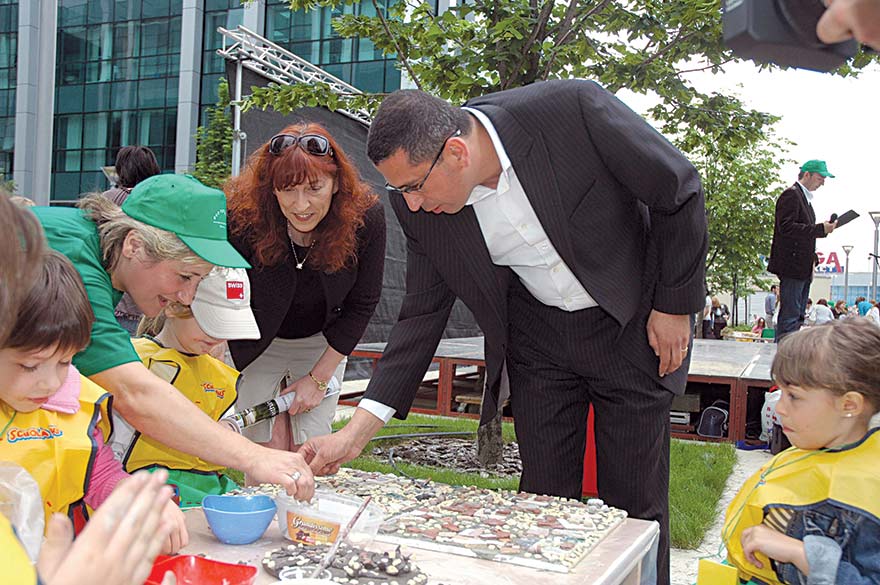The New Year’s holidays having always been a time for summing up results and making decisions for the year ahead. And a time of giving
In the corporate world, this need to give gifts and recognition on an annual basis has not changed; it has existed “since time immemorial”, just as our need to give to the wider community is not an expression of either the contemporary world or modernity, as a different philosophy of doing business, but rather is probably one of the immanent features of our civilisation.
Traces can extend back deeply, but let me stop at giving to those who are weaker, those who are without, and that ennobling act also gives meaning to our lives and even deeper meaning to our work; “added value”, as someone would say today.
Corporate giving, or corporate social responsibility, CSR, has a slightly different definition, but I believe it comes from the same source of desire for the successful to partly give something back to the wider community, making it better, more beautiful, more humane and making themselves and their efforts more meaningful through that act. And that ‘R’, which stands for responsibility, articulates the need for modern business operations to prove and demonstrate responsibility for the moral aspect of doing business in the broadest sense.
Today we would also add to this strengthening through a common goal directed towards the greater good of the wider community, from the neighbourhood in which we operate to responsibility for the future of the planet…

Why do i mention that specifically?
Because of the general divide between an act that’s directed solely towards giving for philanthropic purposes or giving to vulnerable groups or donations, and giving through social programmes or projects aimed at raising awareness to a higher level to make our wider urban, national or global environment better…
As someone who is primarily an advisor and creator of CSR policy for my clients, I’ve often been asked how to choose the right corporate goal that is appropriate for the client, that makes sense in the context of the size and type of the company, and which is also something we’ll all be proud of, but also an act that will make a difference…
A donation, yes, but always in such a way that it frees from the aspect of self-praise, an advertisement that could hurt the one to whom it is addressed. This is a difficult and very sensitive issue, but it is possible – with careful consideration, empathy – to reach a good result that helps discreetly and meaningfully, and brings pride to your entire team.
The traditional principle of giving in such a way that you do not know to whom you are giving and the recipient does not know from whom a gift has come has for many centuries been considered the highest form of help, both personal and corporate… This is possible as an individual act, but it’s tougher in the corporate world, while from the aspect of corporate needs it isn’t even a valid request. On the other hand, if CSR is conceived in such a way that it is obvious that it represents an attempt of a client to “clear their conscience”, while that client has completely different standards of doing business, or the action is obvious free PR, it will ultimately return to the corporation like a boomerang, bringing only a negative image instead of benefits and satisfaction.

Viewed in theoretical terms, since the time that the term CSR was coined and came into use, in the United States in the 1950s, it has undergone many changes and new connotations.
This business morality aspect has not changed, and I believe that striving towards that makes a lot of sense and is justified in both business and social terms.
And it is practically better and yields results, thus my thinking would go in the direction of: use a little creativity to depart from clichés and see what your stronger sides really are and what your true potential contribution is in that domain, then the project will simply shape itself in the best direction. Young creatives will find it easier to identify with a project to protect the planet or wastewater, or just to save a waterway that is closest to them, rather than some high-octane action that’s far away from them and which, regardless of its grandeur, absolutely doesn’t reflect the needs of their company.
If you are giving, “teaching someone to walk” is a principle that I would always prefer to choose for corporate CSR. Through education, through the providing of a market opportunity, or donating space itself, buying equipment or giving knowhow, you are giving someone a platform on which they can develop and can become one who will do the same tomorrow for the next generation. Enriching the concept of social giving from the R = responsibility aspect, CSR has undoubtedly gained much and is today more closely understood by young businesspeople who have a need to articulate their active relationship towards the immediate and wider community.

That’s how each of our creative actions in which we gave space at the Airport City Belgrade business park to creative people, in order to prove themselves and to create new value from that, has paid off many times over and enriched the company’s image.
And our team is extremely satisfied and proud when they see young people who gained their first serious business experience in collaboration with us.
And for donations in this context we’ve always selected either developmental creative projects or, when it comes to marginal or deprived groups, projects in which the recipient doesn’t receive a simple donation, but rather space to develop all of their potential and become independent in the scope of their possibilities.
Not a long way, but actually it is.